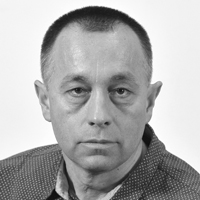 TOLO.RO
TOLO.RO
 TOLO.RO
TOLO.RO
luni, 19 decembrie 2011, 12:27
[tab:ROMANIAN Version]
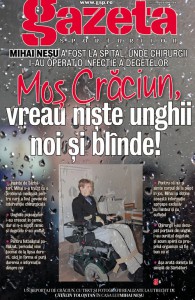 Mihai Neşu a fost la spital, unde chirurgii i-au operat o infecţie a degetelor. Gazeta publică azi un articol multimedia realizat la Utrecht.
Mihai Neşu a fost la spital, unde chirurgii i-au operat o infecţie a degetelor. Gazeta publică azi un articol multimedia realizat la Utrecht.
» Înainte de Sărbători, Mihai s-a trezit cu o problemă medicală pentru care a fost nevoie de intervenţie chirurgicală
» Unghiile picioarelor i-au crescut în carne, dar el n-a simţit nimic şi degetele s-au umflat
» Pentru fotbalistul paralizat, pericolul vine tocmai de la lipsa durerii, căci în forma ei pură durerea e informaţie despre noi
» Pentru că nu-şi simte corpul de la piept în jos, Mihai îşi obţine această informaţie aproape exclusiv cu mintea şi cu sufletul
» Chirurgii i-au decupat porţiuni din unghii, i-au curăţat degetele şi acum speră ca propriul organism să fie bun cu el
» Aşa arată dorinţa lui simplă de Sărbători.

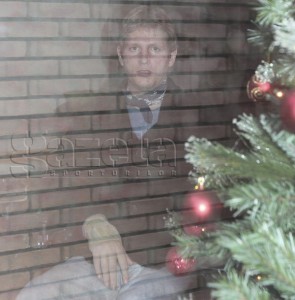 Nu ştiu cum am reuşit această fotografie. Norocul începătorului.
Nu ştiu cum am reuşit această fotografie. Norocul începătorului.
Prin geamul casei din Utrecht, Mihai apare ca o umbră translucidă, prinsă între două lumi. În faţă e grădina spre care priveşte, cu iarba udă şi cu zidul garajului transformat în baie, vizibil ca un caroiaj cărămiziu, misterios reflectat pe sticlă.
Lîngă silueta fotbalistului în scaun cu rotile, luceşte bradul amenajat de tatăl său Mircea Neşu, se dovedeşte că foştii arbitri morocănoşi sînt neaşteptaţi cunoscători ai sufletului Crăciunului şi produc „un pom aşa de frumos, că toţi olandezii care intră în casă fluieră de uimire”. Iar în spatele lui Mihai, pretutindeni, se întinde livingul.
Cei 70 de metri îi sînt dormitor, sală de mese, tribună pentru meciurile de fotbal infinite care se derulează pe televizor şi pistă pentru scaunul cu rotile, o puternică uzină pe roţi, „Primăria plăteşte scaunul tuturor oamenilor paralizaţi, costă 20.000 de euro cu toate opţiunile, ca la maşini”, explică Mihai.
Tocmai s-a întors de la spital, unde medicii i-au decupat părţile de unghii care infectaseră degetele de la picioare. Au intrat în carne, pe un om obişnuit l-ar fi durut de ar fi înnebunit, dar Neşu, care nu-şi simte picioarele, a fost surprins cum unghiile i-au crescut tăios în degete, ca un pericol neştiut. Pentru el, riscul este silenţios şi, poate de aceea, bărbatul de 28 de ani nu caută liniştea, ci sunetele, arsura simţurilor şi harababura pe care o aduce vecinătatea semenilor.
Aceasta e povestea oamenilor care-l înconjoară şi a zilelor care trec.

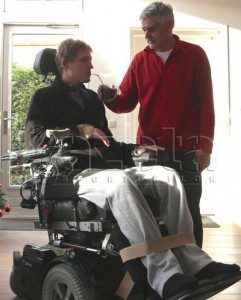 Degetul ars pe calorifer
Degetul ars pe calorifer
Maria a văzut ceva ciudat sau a adulmecat aroma irevocabilă a pielii de om arse pînă la carne, mireasmă greţoasă pe care o recunoaştem cumva prin codul genetic, deşi n-o întîlnim decît rareori.
„Mihai ţinea mîna pe calorifer de multă vreme şi n-a băgat de seamă că i se arde de la căldură. Uite cu ce semn a rămas la mîna dreaptă”, îmi arată cei doi, veseli ca la rememorarea unei pozne din vacanţa de vară.
E chiar mîna dreaptă pe care fotbalistul o poate mişca parţial; se scarpină cu ea la faţă, conduce scaunul cu rotile, dar nu poate mînca sau apuca obiecte.
Şi, deşi mişcă această mînă, nu-și simte toate degetele de la ea. Aşa i-a atîrnat pe calorifer, rătăcit, un cîrnăcior alb şi mic. „Uite rana!”, insistă ei. Pe deget, în locul arsurii a rămas un semn rombic, ca un giuvaier de sînge uscat încununînd inelul unei zile.
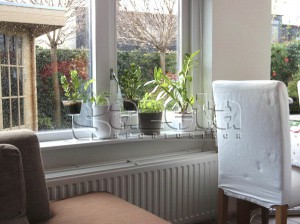 Cartierul de jucărie
Cartierul de jucărie
Asta a fost cînd încă mai era în spital. Viaţa lui e plină de astfel de întîmplări şi de oameni cu care le împarte.
Discreţi sau gălăgioşi, voluntari sau bine plătiţi, competenţi sau pur şi simplu stîngaci, ei dislocuiesc neputinţa din viaţa lui Mihai Neşu şi lasă loc liber pentru ca fotbalistul să se simtă „dacă nu normal, măcar firesc”, după cum spune el.
Ziua îi începe la 8, cînd tata sau mama vine să-l trezească. Casa nu e mare, cam 80 de metri pătraţi pe două niveluri. Părinţii şi Maria dorm la etaj, iar Mihai şi-a amenajat un pat într-un colţ din living, de unde vede televizorul şi grădina mică, cu doi pomi. Mai e şi căsuţa din lemn, pusă într-un colţ al curţii, pe post de loc de depozitare şi de fumoar semiclandestin pentru părinţi.
Dreptunghiul verde nu are mai mult de 50 de metri pătraţi şi e separat prin garduri de vegetaţie de grădinile identice, ale vecinilor. Toată zona a fost proiectată din case tip, create fără ostentaţie, cu maşini mici în faţa garajului; parcă-s modele cumpărate din magazinele de hobby miniatural! E plin Utrechtul de prăvălii colorate, unde pasionații își găsesc trenuleţe, miniautovehicule şi machete de avioane sau vapoare.
S-a luminat în casa familiei Neşu.
Scularea şi spălarea, băiete!
Abia trezit, Mihai trece prin procesul lent al mutării din pat în duş şi, apoi, al urcării în scaun. Vin doi asistenţi zilnic dimineaţa şi unul seara, cînd drumul e invers: de la cărucior la pat.
Diferenţa e că dimineaţa trebuie şi spălat, e nevoie de doi asistenţi. Baia are uşa la un metru de pat şi arată precum un muzeu al tehologiei cumsecade. Fără prea multe beculeţe şi butoane, mai degrabă cu instalaţii serioase, pe care te poţi baza.
În mijloc stă macaraua, înaltă de doi metri, al cărui braţ îl ridică pe Mihai din pat cu un hamac. Mişcările tuturor sînt fireşti, profesioniste şi lipsite de falsă jenă. Doar un prosop îi înveleşte şoldurile cînd e dezbrăcat de tot, înainte de spălare, sau cînd, întins pe pat, i se pune pijamaua, seara.
Dar încă e dimineaţă. Trezirea şi spălarea durează 45 de minute. Îl spală şi pe dinţi, el aşteaptă liniştit, glumind cu ajutoarele, „Marvin, tu eşti Iniesta al asistenţilor”, pînă cînd se vede în scaun.
Hai că începe spectacolul!
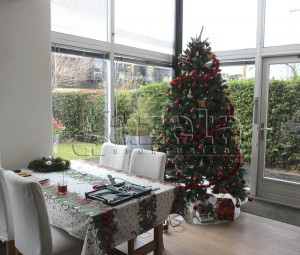 Dă lecţii de jurnalism multimedia
Dă lecţii de jurnalism multimedia
Ajuns în cărucior, devine copilul absolut şi despotul capricios al casei. Ştie despre fiecare lucru unde e aşezat, „tată, dă-mi, de la etaj, lada aia de cabluri!”. Mircea Neşu coboară cu o cutie de carton. Mihai îmi indică unde să răscolesc, am nevoie de un cablu HDMI ca să transfer nişte fişiere filmate ieri.
Rîde în faţa incompetenţei mele de fotoreporter şi de cameraman, „Gata, ţi-ai depăşit atribuţiile!„. Mereu curios, mă roagă să-i arăt laptopul. „Ce procesor are?”, „Procesorul lui mama, habar n-am!”.
Apoi, vrea să vadă de aproape obiectivul foto şi ghiceşte din iconurile de pe rotiţa aparatului Canon care-i starea de vizualizare a imaginilor video. „Ia uite, ce m-am îngrăşat”, exclamă el. Cu un ochi trage tot la hieroglifele Canon şi cu bandana albastră la gît e un leit Champollion al acestei dimineţi.
Cine e tipul chelios?
Micul dejun începe cu toţi la masă, iar în capul locului stă Mihai, care soseşte singur, butonînd scaunul. Îi dă de mîncare Mircea, cu furculiţa direct în gură. Tot tatăl prepară şi ceaiul, iar apoi îi ţine cana pentru ca Mihai să bea cu paiul.
Tihna nu durează mult. Sună cineva la uşă. Năvălesc, proaspeţi din aerul rece de afară, o femeie şi un bărbat. „Sînt vecina noastră şi un prieten”, explică Maria.
Femeia vine aproape în fiecare zi, îi ajută şi la crearea Fundaţiei Mihai Neşu, bărbatul e şi el nelipsit. „Ce mai e de făcut?”, întreabă cheliosul mărunt şi calm. „Nu se închide uşa”, îi arată Mihai cu bărbia uşa care dă spre grădină. Omul se duce la trusa de scule, ştie exact unde e în casă, şi începe să trebăluiască la clanţă. Între timp, Mihai îi cere şi un înlocuitor pentru braţul metalic care-i ţine nelipsitul iPhone la nivelul feţei. „S-a rupt aseară şi sînt în silenzio stampa”, îi explică, amuzat, fotbalistul. Rîd amîndoi.
Tipul se uită, măsoară din ochi, întoarce telefonul pe toate feţele, spune „Se face” şi apare într-o jumătate de oră cu braţul reparat. „Are serviciu?”, întreb. Toată familia se amuză. „E patronul celei mai mari firme de construcţii din Utrecht! Îl ajută voluntar pe Mihai”.
Ca să-mi treacă prostia, iau o gură dublă de ţuică tare adusă de la Oradea. „Ţi-am zis eu că e bună”, rîde Mircea Neşu.

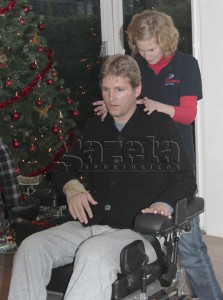 Pe femeie o cheamă Wendy, numele bărbatului este Frans, iar prezenţa lor are mai multe explicaţii.
Pe femeie o cheamă Wendy, numele bărbatului este Frans, iar prezenţa lor are mai multe explicaţii.
Întîi, asişti la exprimarea relaxată a culturii compasiunii reale din Olanda.
„Cînd Mihai era în spital, apăreau doamne în vîrstă, ca mine, aşa”, îşi aminteşte Monica, mama lui Mihai, în amuzamentul nedeghizat al aripii masculine, care-i taxează cochetăria de a spune „doamne în vîrstă, ca mine”.
„Aici e o bucurie să ajuţi pe cineva fără bani. Cînd eram internat la spital, veneau din proprie iniţiativă, o dată pe săptămînă, ca să ajute bolnavii cu handicap”
„Uite-te, e chiar Neşu!”
Dar mai e ceva. Mihai a fost un sportiv inimos şi un om sufletist. Iar roata de fier a destinului, care l-a apăsat pe vertebra cervicală C3 pînă i-a strivit-o, i-a răsucit paradoxal şi luminos serviciile pe care le făcuse, dezinteresat, celor din jur.
Cheliosul Face Tot, de pildă, a ajuns să-l îndrăgească pe român după ce, înainte de a se accidenta, Mihai a răspuns entuziast, fără nici o fiţă de vedetă, apelului de a ţine lecţii la şcoala de fotbal unde joacă şi fiul lui Frans, patronul firmei de construcţii.
Pentru puşti a fost formidabil să aibă în faţă un fotbalist de la echipa mare a lui FC Utrecht. Pentru părinţi, o mîndrie. Mai ales într-o ţară unde fotbalul îşi întinde plasa de farmec peste aproape toţi copiii şi tinerii, de vreme ce sînt nu mai puţin de 10 divizii cu jucători legitimaţi în Olanda!
Recompensa faptelor bune
Felul acesta modest de a fi, „smerit”, după cum îl caracterizează prietenul său bun, George Ogăraru, i se întoarce acum favorabil lui Mihai, prin şuvoiul deconcertant de lume care-i intră în casă pentru a-i da o mînă de ajutor.
„La un moment dat, Wendy a venit împreună cu o altă vecină să mai stăm de vorbă. M-au văzut obosită şi m-au îndemnat să fac un drum în oraş”, zice Maria. „Cînd m-am întors, era totul lună, spălaseră şi făcuseră curăţenie fără să le roage nimeni”.
În altă zi, sub alţi nori, precum cei care şterg acum geamurile care dau spre grădină, s-au trezit la uşă cu trei bărbaţi. Nici unul nu era din vecini. Auziseră că e nevoie să schimbe dalele dinspre grădină, ca să nască în locul scărilor o pantă lină pe care Neşu să poată ieşi la aer cu scaunul cu rotile. „În trei ore au terminat totul”, rememorează mama lui Mihai. „Ne-au spus de la început că e voluntariat!”.
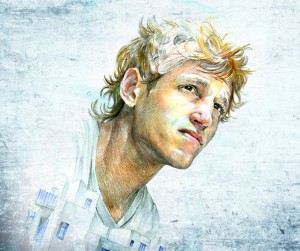 Un tablou în ramă
Un tablou în ramă
Mihai ascultă poveştile alor săi, cu un ochi la televizor şi cu unul în iPhone-ul pe care îl poate împunge din nou cu stick-ul de cauciuc ţinut în gură.
E un model tocit, i s-a spart ecranul în dreapta jos. „Aştept să împlinesc un număr de luni de abonament şi o să primesc de la operatorul de telefonie un model nou, un 4S”, spune el. Pe scurt, aşteaptă o ofertă.
Are un netulburat raport olandez cu banii. Poţi să-i spui în faţă că e zgîrcit şi se uită nedumerit la tine. Cînd a văzut pe masă desenul original al lui Dan Voinea, graficianului Gazetei, cel care a ilustrat în septembrie reportajul din spital, s-a bucurat: „Îi punem ramă!”. „Da, e plin oraşul de galerii de artă, cumpăr o ramă deosebită„, îi răspunde Maria, care a terminat o specializare de recondiţionare de artă.
Mihai întoarce scaunul din manetă şi zice: „Da, de la Ikea nu-i bine? Am văzut nişte rame super la Ikea”, provocîndu-i un hohot de rîs femeii, tocmai din bucătăria deschisă unde se uită cum soacra sa face sarmale. ”Știți vreun român care nu mănîncă sarmale?”, întreabă mama lui Mihai.
A venit patul de la Ritz
Sună din nou cineva la ușă.
Intră un bărbat înalt, elegant, cu o geantă din piele de porc. „Doctore, ai venit cu o săptămînă mai devreme”, spune sportivul. Pare ministrul sănătăţii, dar e doar medicul de familie, care a greşit programarea. Nu se apucă să-l consulte, dar ia un ceai şi se interesează ce-i fac degetele. Şi el sesizase problema care avea să-l ducă la spital peste două zile.
Nu apucă să iasă doctorul, că apar doi bărbaţi cu o saltea în braţe. „Wow, mi-a venit noul pat! Să-l văd, e de Ritz sau de Hilton?”, exclamă Mihai, rotindu-se tăcut cu scaunul în jurul minişantierului.
Îl privesc şi încerc să-l înţeleg. Nu-şi stăvileşte nici un moment autoderiziunea, armînd-o în interiorul său ca pe un mecanism psihologic care îl ajută să pornească de jos şi să se bucure de orice progres al zilei.
Bărbaţii aduc patul cel nou, care are rame de lemn, un progres faţă de epoca fierului din care se revendica vechiul pat. În rest, are cam aceleaşi funcţii. Se ridică din telecomandă orice parte a sa. „Faceţi valuri!”.
Tabloid versus voodoo
Cei ai casei încearcă să strîngă vechiul pat, într-un soi de lego reversat, cu zero şanse în faţa combinaţiei de mecanică şi electronică. Fără să-i roage nimeni, bărbaţii care l-au transportat pe cel nou se apucă ei să facă treaba. „Să nu exagerăm, nu toţi sînt amabili, dar eu am noroc„, zice Mihai.
Apare o fată. Zîmbeşte şi ocupă familiar mijlocul camerei. Sînt deja ameţit de pelerinajul uman, mă uit la ea ca la o variantă feminină a lui David Copperfield, e toată surîs şi charismă. N-aş fi foarte mirat dacă s-ar apuca să facă un număr de magie ca să înveselească asistenţa aşa, de după-amiază.
„E Mariska, kinetoterapeuta”, spune Maria. „Sînteţi de la un tabloid?!”, mă ironizează Mariska, păstrîndu-şi zîmbetul pe buze. „Da, aşa cum tu nu eşti de la kinetoterapie, ci de la voodoo!”, îi răspund.
Dar nu atunci îi răspund, ci peste o zi, în gînd, aşa cum vin toate replicile deştepte.
„Ai tot felul de chestii prinse în gît”
Mariska începe să facă exerciţii cu Mihai, la gît, la mîna dreaptă şi la cea stîngă. „Chiar dacă nu o poate mişca, e vital să rămînă ligamentele valide”, spune Mircea Neşu, ce destin!, el însuşi medic sportiv.
Tipa e profi, nu cade nici un moment sub linia compătimirii, de acolo de unde pacientul s-ar putea lăsa pe tînjeală. Da, doare, da, transpiră, dar n-are ce face şi Mihai trage înainte de el.
Iată cum arată o parte a dialogului lor:
I-a adus contractul prin care sindicatul fotbaliştilor îi plăteşte asigurarea pentru că şi-a încheiat cariera accidentat.
Aproape 160.000 de euro. „Mi-au dat pagubă totală”, se amuză el, indicînd contul unde să meargă banii.
Urmează trei ore de fotbal la televizor, mailuri prin care lucrează pentru fundaţia sa, redactează singur un brief în care explică motivele, „Care-i obiectivul? Să fac viaţa mai uşoară copiilor cu handicap din România”.
„Deja am discutat cu primăria din Utrecht, care-mi dă 200 de scaune cu rotile şi alte utilaje pentru copiii paralizaţi din România. Vom începe în Oradea şi sper să ne extindem”
Semnătura lui Andrei Pleşu şi melodia de pe YouTube
Pe la 10 şi jumătate seara, apare asistentul care-l aranjează de culcare. Înainte de a se supune ritualului decepţionant al macaralei, Mihai mai priveşte o dată, pe YouTube, secvenţa în care suporterii Stelei îi strigă numele. „A postat-o un prieten pe YouTube”, spune el.
Mama îşi aminteşte că, pe vremuri, înainte ca internetul să captureze şi să proiecteze imaginaţia lumii, la începutul anilor ’90, Mihai a cîştigat un concurs de benzi desenate la Constanţa. „A venit mîndru acasă cu diploma semnată de Andrei Pleşu, care era ministrul culturii”.
Bucata de carton e şi acum în casa de la Oradea, vestigiu al unei lumi rezistente.
De curînd, şeful Google a anunţat că, la fiecare două zile, se procesează în lume cinci exabaiţi de informaţie, atît cît produsese umanitatea de la origini şi pînă în anul 2008. Deci şi diploma premiului lui Mihai la concursul de benzi desenate.
Numai Facebook găzduieşte 140 de miliarde de poze, jumătate dintre ele fiind postate în ultimul an. Iar YouTube livrează trei miliarde de filmuleţe pe zi, unul dintre ele fiind urmărit în livingul din Utrecht de bărbatul blond.
Cinci exabaiţi pe zi! O fi de bine? Pare cam înspăimîntător. Poate că e mai puţin decît un progres, dar oricum e mai mult decît o alinare.
[tab:ENGLISH Version]
 Mihai Neşu had to go to the hospital, where the surgeons operated on an infection on his toes. Gazeta Sporturilor publishes today a multimedia story from Utrecht
Mihai Neşu had to go to the hospital, where the surgeons operated on an infection on his toes. Gazeta Sporturilor publishes today a multimedia story from Utrecht
» Before the winter holidays, Mihai suffered, unexpectedly, from a medical problem that required a surgical procedure
» His toenails had grown into his flesh; he didn’t feel anything, and therefore his toes swelled
» For the paralyzed football player, the danger lies precisely in the absence of pain, since, in its pure form, pain is the one that delivers information about us
» Because he cannot feel his body from the chest down, Mihai gets this information almost exclusively through his mind and soul
» The surgeons cut out portions of his nails, cleaned his toes and are now hoping that his own body will be good to him
» This is his simple holidays wish

 Mihai is surrounded by the latest technology, is stimulated by his own technical abilities, but what really makes the difference are the people around him
Mihai is surrounded by the latest technology, is stimulated by his own technical abilities, but what really makes the difference are the people around him
I have no idea how I managed to take this picture. It is pure beginner’s luck.
Through the window of his house in Utrecht, Mihai appears like a translucent shadow, caught in between two worlds. In front of him lies the garden he is looking at, with the wet grass and the wall of the garage turned into a bathroom, visible here like some brick-coloured grid, reflected mysteriously on the glass.
Next to the silhouette of the football player in his wheelchair shines the Christmas tree decorated by his father, Mircea Neşu. It turns out that former grumpy football referees are unexpected connoisseurs of the Christmas spirit, able to create “such a beautiful tree, that all the Dutch people entering the house whistle in surprise”. Behind Mihai lies the living-room.
The 70 square metres make up his bedroom, dining room, stand for the endless football games playing on TV and track for his wheelchair, a powerful engine on wheels, “the City Hall buys the wheelchair for every paralyzed person, this one cost 20,000 €, it’s fully equipped, like a car”, Mihai smiles.
He has just returned from the hospital, where the doctors cut out the pieces of nails that had infected his toes. They had ingrown: for a regular person, it would have been excruciatingly painful, but Neşu, who cannot feel his legs, was surprised to see that his nails had grown sharply into his flesh, like an unknown danger. In his case, the risks are silent, and maybe this is why the 28 year-old is not looking for silence, but for sounds, for the burning of the senses and for the chaos brought about by the closeness of his fellow human beings.
This is the story of the people that surround him and of the days that go by.

 THE BURNT FINGER ON THE RADIATOR
THE BURNT FINGER ON THE RADIATOR
Maria saw something weird or maybe she smelled the implacable smell of human skin burnt to the flesh, that nauseating scent that we somewhat recognize through our genetic code, although we rarely encounter it in real life.
“Mihai had been keeping his hand on the radiator for a long time and he didn’t realize that it was starting to burn from the heat. Look at the mark left on his right hand”, the two of them show me, laughing as if they were remembering a mischief from the summer holiday.
It is the same hand that the football player can partially move; he scratches his face, he drives his wheelchair, but he cannot eat or grab any objects with it.
And, although he can move his right hand, he cannot feel all its fingers. This is why the stray finger was left hanging on the radiator, like a little white sausage. “Look at the wound!”, they insist. On his finger, where the burn once was, is now a lozenge-shaped mark, like a dried blood diamond crowning a day’s ring.
 THE TOY-LIKE NEIGHBOURHOOD
THE TOY-LIKE NEIGHBOURHOOD
That story happened while he was still in hospital. His life is full of such stories and of people that he shares them with.
Discreet or noisy, volunteers or well paid, skilful or simply clumsy, they remove the helplessness from Mihai’s life and leave instead a free space in which the football player can feel that he is “if not normal, at least myself”, as he puts it.
His day begins at 8 o’clock, when his father or mother wakes him up. The house is not big: it has around 80 square metres on two levels. His parents and Maria sleep upstairs, while Mihai had a bed installed for him in a corner of the living room, from where he can see the TV set and the small garden with two trees. And also, in a corner, the little wooden garden house that serves as a storage room and semi-clandestine smoking area for his parents.
The green rectangle is not bigger than 50 square metres and is separated with fences and vegetation from the neighbours’ gardens, that look exactly the same. The whole area is made up of identical houses, designed with no desire to impress: small cars are parked in front of the garages, looking like some miniature models bought in a hobby store! Coloured little shops, where the passionate collectors can find miniature trains, cars and plane or boat models, are everywhere in Utrecht.
The Neşu’s family home has lightened up and a new day begins.
WAKE UP AND WASH YOURSELF, BOY!
Soon after he wakes up, Mihai goes through the slow process of being moved from the bed to the shower and then into the wheelchair. Two nurses come every morning. One nurse comes every evening, when the process is reversed: from wheelchair to bed.
In the morning, he needs to be washed as well, hence the two nurses. The bathroom, whose door is located a metre away from the bed, looks like a museum of friendly technology. Not too many lights and buttons, but rather solid, reliable installations.
The two-metre high crane is in the middle; the crane’s arm lifts Mihai from the bed in a hammock. Everybody’s movements are natural, professional and lack all feigned embarrassment. Nothing but a towel is wrapped around his hips when he is fully undressed, before being washed, or when he is lying in bed at night, waiting to be dressed in his pyjamas.
But it is still morning. The waking and washing up take 45 minutes. The nurses also brush his teeth, while he waits patiently, joking with his helps, “Marvin, you are the Iniesta of nurses”, until he is finally placed in his wheelchair.
And now the show begins!
 HE TEACHES MULTIMEDIA JOURNALISM LESSONS
HE TEACHES MULTIMEDIA JOURNALISM LESSONS
As soon as he gets in his wheelchair, Mihai becomes the absolute child and whimsical despot of the house. He knows where every object can be found, “dad, bring me that cable box from upstairs!” Mircea Neşu comes downstairs with a cardboard box. Mihai tells me in which place to dig up, I need an HDMI cable in order to transfer some files that I filmed yesterday.
He laughs at my lack of competence as photographer and cameraman, “This is it, you went well beyond your attributions!”. Relentless in his curiosity, he wants to see my laptop. “What processor does it have?”, “I don’t have a clue, some goddamn processor!”
He then wants to see the camera’s lens from up close and guesses from the icons on the Canon device’s wheel the images’ zooming percentage. “Look at that, how fat I’ve grown!”, he exclaims. With one eye he is still peeping at the Canon hieroglyphs and, with the blue bandana wrapped around his neck, he looks like the morning’s perfect Champollion.
WHO’S THE BALD GUY?
Breakfast starts when everybody is present; Mihai, who comes unassisted, driving his wheelchair around, takes his seat at the table head. Mircea feeds him, bringing the food to his mouth in a fork. His father is also the one who prepares his tea and then holds the cup for Mihai to drink with a straw.
The quietness isn’t there to last. Somebody rings the doorbell. A man and a woman, fresh from the cold outside air, burst in. “She is our neighbour and he is a friend”, Maria explains.
The woman comes almost every day; she also helps them in setting up the Mihai Neşu Foundation. The man is a constant presence as well. “What else needs to be done?”, the short, calm bald guy asks. “The door doesn’t close”, Mihai points with his chin towards the door leading into the garden. The man goes to the tool box – he knows exactly where to find it in the house – and starts working on the door handle. While he is busy doing that, Mihai also asks him for a replacement to the metallic arm holding the ever present iPhone in front of his face. “It broke last night and since then I am in silenzio stampa”, the football player explains, amused. They both laugh.
The guy takes a look, measures with his eyes, turns the phone upside down, says “Consider it done” and comes back half an hour later with the fixed arm. “Does he have a job?”, I ask. The whole family is amused. “He owns the biggest construction company in Utrecht! He helps Mihai as a volunteer”.
In order to be cured of my stupidity, I take a double sip from the strong tuica, the Romanian plum brandy brought from Oradea. “I told you it was good”, Mircea Neşu says, laughing.

 Neşu’s modesty from the time when he was one of the main players of FC Utrecht has turned him into a person that the people around him love and support in his new life.
Neşu’s modesty from the time when he was one of the main players of FC Utrecht has turned him into a person that the people around him love and support in his new life.
The woman’s name is Wendy, the man is called Frans, and their presence here has several explanations.
First of all, this is the relaxed expression of the Dutch culture of real compassion.
“When Mihai was in hospital, older ladies, like me, used to come by”, Mihai’s mother, Monica, remembers, to the undisguised amusement of the male side of the family; both men make fun of her for being such a “coquette” when saying “older ladies, like me”.
“Here, it is a joy to help somebody without getting paid for it. When I was in the hospital, there were people who came once a week, on their own initiative, to help the handicapped persons.”
“LOOK, IT’S NEŞU HIMSELF!”
But there is something more to it. Mihai was a generous athlete and a kind-hearted man. And the iron wheel of destiny, the one that pressed on his cervical vertebra C3 until it crushed it, also twisted and directed towards him, in a paradoxical and bright way, the services that he himself had rendered, unselfishly, to the people around him.
The bald Jack-of-All-Trades, for instance, has become fond of the Romanian after Mihai, before his accident, had responded enthusiastically, without any big star fuss, when he was asked to teach football lessons at the football school where the construction company’s owner’s son is enrolled.
For the kid, it was formidable to have in front of him a football player from the main FC Utrecht team. For the parents, it was pure pride. All the more so in a country where football casts its magical net over almost every child and teenager, given that there are no less than 10 leagues with officially enrolled players in Holland!
THE REWARD FOR GOOD DEEDS
This modest way of being, “humble”, as his good friend, George Ogararu, describes him, is now being returned to Mihai in a favourable way through the incredible flow of people that come into his home in order to lend a helping hand.
“At one point, Wendy came by with another neighbour, to chat. They saw that I was tired and encouraged me to go for a walk into town”, Maria says. “When I got back, the house was spotless: they had cleaned and washed everything, without anybody asking them to.”
On another day, under a different set of clouds, like the ones that now rub the windows opening into the garden, three men rang the doorbell.
None of them was from among the neighbours. They had heard that the tiles of the alley leading into the garden needed to be changed, that the stairs needed to be removed in order to make room for a smooth slope that Mihai could use to go outside in his wheelchair. “They finished all the work in three hours”, Mihai’s mother remembers. “They told us, from the very beginning, that it was voluntary work!”
 A FRAMED PICTURE
A FRAMED PICTURE
Mihai is listening to the stories his family is telling, looking with one eye at the TV set and with the other at the iPhone that he can use again with the help of the rubber stick that he keeps in his mouth.
The iPhone is all worn-out; the screen is broken in the right lower side. “I am waiting to gather a certain number of months on my subscription, and then the mobile operator will give me a 4S model”, he says. In brief, he is waiting for a promotional offer.
He has an undisturbed Dutch-like relationship with money. If you tell him, straight to his face, that he is cheap, he will look at you bewildered. When he saw on the table the original drawing that Dan Voinea, Gazeta Sporturilor’s graphic artist, made in order to illustrate the September story from the hospital, he was happy: “We’ll frame it!”. “Yes, there are plenty of art galleries in town, I’ll buy a special frame”, Maria, who holds an art restoration degree, replied.
Mihai turned the wheelchair with the joystick and looked at her, perplexed: “But what about Ikea, wouldn’t that do? I saw some super frames at Ikea”, he said, making the woman, who was watching her mother-in-law cook sarmale – the traditional Romanian rolls of minced meat and sour cabbage – in the open kitchen, burst into laughter.
THE ARRIVAL OF THE BED FROM RITZ
Once more, somebody rings the doorbell.
A tall, elegant man walks in, carrying a pig-leather bag. “You came one week earlier, doctor”, Mihai says. The man looks like the Health minister, but is in fact the family doctor, who mixed up the appointment. He doesn’t begin the consultation, but accepts a tea instead and enquires about Mihai’s toes. The physician had also noticed the problem that would bring Mihai to the hospital two days after the observation was made.
The doctor is barely out of the house, that two men surge in, carrying a mattress. “Wow, my new bed is here! Let me see, is it Ritz or Hilton material?”, Mihai exclaims, and then swirls silently in his wheelchair around the mini-construction site.
I watch him and I try to understand him. He doesn’t restrain, not for a single second, his self-deprecation, bracing it inside like a psychological mechanism that helps him start from the bottom and enjoy any progress that he makes in the day.
The men bring in the new bed, which has a wooden frame, an evolution compared to the Iron Age that the old bed belonged to. The remaining functions are pretty much similar. It can be lifted from any side with the remote control. “Make waves!”
TABLOID VERSUS VOODOO
The Neşu family are trying to fold the old bed, in some kind of reversed Lego, with zero chances of success when confronted with the combination of mechanics and electronics. Without being asked, the men who delivered the new bed take on the job themselves. “Let’s not blow this out of proportions, not everybody is so nice, I am just lucky”, Mihai says.
In comes a girl. She smiles and takes possession of the space in the middle of the room with a familiar attitude. I am already dizzy from all this pilgrimage; I look at her like she’s some kind of female version of David Copperfield, all smiles and charisma. I wouldn’t be very surprised if she started doing some magical number, just like that, only to cheer up the assistance on this ordinary afternoon.
“This is Mariska, the physiotherapist”, Maria says. “Are you from a tabloid?!”, Mariska asks me ironically, while keeping her smile on. “Yes, just like you are not from the physical therapy department, but from a voodoo gathering!”, I reply.
But I don’t obviously reply on the spot; the answer comes the next day, in my head only, like all smart lines do.
“THERE’S ALL KIND OF STUFF IN YOUR NECK”
Mariska starts doing the exercises with Mihai; they work on his neck, right and left hand. “Even if he cannot move his left hand, it is vital that the ligaments remain functional”, says Mircea Neşu, who is, what a twist of the destiny!, a sports medicine doctor himself.
The girl is professional, she doesn’t fall, not even for one second, below the compassion line, a line from where the patient might start to get lazy. Yes, it hurts, yes, he’s sweating, but he has no choice and he keeps pushing himself forward.
This is a part of their dialogue:
160,000 EURO FROM THE FOOTBALL PLAYERS’ UNION
It’s dark outside when Mariska leaves. In comes one of Mihai’s colleagues from FC Utrecht.
She brings him the contract according to which the football players’ union pays him the insurance that he is entitled to after having ended his career because of an injury.
Close to 160,000 euro. “They gave me the compensation for total loss”, Mihai is amused, while he specifies the account where the money should be transferred to.
Then ensue three hours of football on TV and e-mails dealing with the setting up of his foundation; he writes himself a brief note explaining the reasons why he wants it done: “What’s the objective? The objective is to make the life of the Romanian children with disabilities easier.”
“I have already discussed with the Utrecht City Hall, they will give 400 wheelchairs and other installations for the paralyzed children from Romania. We’ll start in Oradea and I hope we’ll be able to extend our operations.”
ANDREI PLEŞU’S SIGNATURE AND THE SONG ON YOUTUBE
At around 10.30 in the evening, the nurse who helps him go to bed arrives. Before submitting himself to the disappointing crane ritual, Mihai watches one more time, on YouTube, the video showing Steaua’s fans chanting his name. “A friend posted it on YouTube”, he says.
His mother remembers how, some time ago, before the Internet had captured and projected the world’s imagination, in the beginning of the ‘90s, Mihai won a cartoon drawing contest in Constanţa. “He came back home, proud to have received a diploma signed by Andrei Pleşu, the minister of Culture at that time.”
The piece of cardboard is still there, in the house in Oradea, a relic of a resilient world.
Recently, Google’s CEO announced that, every other day, five exabytes of information are processed around the world, the equivalent of the entire work that the humanity produced since its origins and up to the year 2008. Mihai’s diploma from the cartoon drawing contest is therefore also included.
Facebook alone hosts 140 billion pictures, half of which have been uploaded in the last year. And YouTube delivers three billion films a day; one of them is watched in the living-room in Utrecht by the blonde young man.
Five exabytes a day! Is it a good thing? It sounds kind of scary. It may be less than a progress, but it sure is more than a comfort.
» From Catalin Tolontan (Utrecht), catalin.tolontan@gsp.ro
» copyright Gazeta Sporturilor
» Translated by Andreea Boldura
Elena • 20 decembrie 2011, 8:47
Un caracter puternic….oare cati dintre noi sa fi ajuns in situatia asta am fi la fel de senini?
Numai bine, Mihai! Multa putere tie si familie!
ioana • 20 decembrie 2011, 9:02
Catalin iti multumim pentru ca, prin articolele tale, ni-l aduci mai aproape….suntem langa el de aici din romania.Nesu esti un om deoaebit, mereu am crezut in tine si acum demonstrezi tuturor ca esti un om mare!!Dumnezeu sa fie cu tine si sa stii ca noi de aici ne gandim la tine!!Mi-ai dat o lectie de viata!!Iti multumesc!!
Lav • 20 decembrie 2011, 10:42
Super articolul despre Mihai Nesu!
Asteptam demult ceva stiri despre el .
Mihai daca citesti comentariile,te admir pt optimismul tau.
Parca n-ai fi roman,ca nu-ti plingi de mila!.Bravo tie ardeleanule!
Eu inca sper ca te vei recupea.Olandezii sunt buni in revalidatie si tu ai vointa.O combinatie perfecta.
Succes Mihai si mersi autorului articolului.
Mircea • 20 decembrie 2011, 12:08
Foarte neinspirat titlul si cateva remarci din material. Ai vrut sa fi original si ai dat un titlu care sa atrega atentia insa ai cazut in derizoriu, caci unghiile crescute in carne sunt ultima problema a lui Nesu. E un aspect al dramei sale, insa unul dintre multele care vin cu un astfel de handicap.
Cand ai fost intrebat/ironizat daca esti de la tabloid de catre kinoterapeuta te-ai revoltat (interior) si ai venit cu o replica ulterior ca ea ar fi voodoo. Incercarea ta de a da culoare acestui material mi s-a parut nereusita.
M-ai obisnuit cu materiale scise foarte bine, un talent peste medie, un spirit obiectiv. Nu le pierde si nu aluneca prea tare pe panta tabloidului caci tu in pozitia ta poti scrie cum vrei. Nu o sa-ti zica nimeni: „Bai Tolontane, vezi ca e cam subtire materialu’ cu Nesu, gandeste-te la un titlu mai atractiv”.
elena • 20 decembrie 2011, 12:39
Mihai, sa te faci bine ! Meriti tot ce e mai bun pe lumea asta ! Ai tot respectul meu . Rezista si lupta ! Sanatate tie si oamenilor din jurul tau ! Sarbatori cu bine !
Monica • 20 decembrie 2011, 12:43
Foarte frumos reportaj! Pacat ca numai suferinta poate naste ceva atat de impresionant. Sanatate lui Mihaita! Si oradenii ii sunt alaturi!
Anda • 20 decembrie 2011, 13:46
Multumesc pentru acest articol. Suntem alaturi de Mihai !
Georgia Radu • 20 decembrie 2011, 14:13
Multumim, Catalin Tolontan! Am, insa, si eu o intrebare: nu stiu, poate n-am citit eu, poate n-am vazut, dar cu ce l-au ajutat FRF sau Liga sau ciobanul Becali (pentru care a jucat suficient si caruia i-a adus o gramada de bani…)pe Mihai Nesu? Sau poate l-au ajutat deja si, repet, n-am citit eu nicaieri…
Altfel, ii doresc lui Mihaita multa, multa sanatate, sa il ajute Dumnezeu sa se refaca, nu neaparat pentru a se intoarce la fotbal, dar pentru a trai fericit alaturi de familia care il iubeste enorm! Nu abandona lupta. „O lupta-i viata, deci te lupta…”, spunea Cosbuc. Craciun fericit, Mihai Nesu!
Smit • 20 decembrie 2011, 14:15
Mahai, doresc ţie şi familiei tale toată puterea pentru viitor! Privind la fotografii, clipuri video şi povestea unei înţelegeri puţin mă pielea de găină. Hang Bivol!
Sper că vom susţine ca orice club poate dumneavoastră şi vă va ajuta să restauraţi cauza ta buna!
Mahai am dor de tine!
Salutari,
Un fan Mahai / Utrecht.
Didutu • 20 decembrie 2011, 14:37
Multa sanatate ii dorim atat lui cat si familiei minunate pe care o are alaturi si il ajuta necontenit sa se ridice din carucior si in limita bolii sa devina un om normal!
Xman • 21 decembrie 2011, 9:19
Foarte bun reportajul, multa sanatate, Mihaita!
Alina • 21 decembrie 2011, 10:50
Nu mi-a fost usor sa citesc articolul pana la capat, intrucat mi-a amintit de momentele prin care a trecut si fratele meu, si care a razbit cu bine.
Multa sanatate si putere de a lupta mai departe, Mihai! Esti fantastic cu o astfel de atitudine si cu acest optimism. Sarbatori cu sanatate pentru tine si intreaga familie!
Eu cred in acest om minunat!
daniel • 21 decembrie 2011, 13:18
@elena: oare cati dintre noi am avea bani ca sa fim senini in locul lui Nesu? Nesu, de bine de rau, e un caz fericit. altul paralizat (si prin urmare fara servici) ar muri de foame singur. sotia sau altii ar mai fi de partea lui daca n-ar avea banii aia care ii vin din fotbal????
mirela, cluj napoca • 21 decembrie 2011, 14:37
Felicitari pentru starea psihica excelenta pe care ai aratat-o in acest reportaj! Toti incercam sa ne dam seama ce drama este in sufletul tau si al familiei tale, esti un barbat tanar si puternic si cu sprijinul si dragostea celor din jurul tau vei trece mult mai usor prin aceasta incercare.
Multa sanatate si bucurii pentru tine si toti cei din jurul tau care iti fac zilele frumoase, ne bucuram nespus sa aflam vesti despre tine. Nu sunt fan al fotbalului, dar povestea ta cutremuratoare m-a emotionat profund.
Craciun Fericit, An Nou Fericit!
Tibi • 21 decembrie 2011, 22:22
@daniel: te inseli. Recuperarea lui Mihai nu este din banii din fotbal ci din asigurarile de sanatate pe care le are in Olanda… Orice om paralizat in Olanda dispune cam de aceleasi posibilitati. Mihai nu este o exceptie..
Mihai, sterkte & fijne feestdagen !
Carlitos • 21 decembrie 2011, 22:34
Domnul Tolontan vad ca vreti sa faceti ceva pt sportul romanesc.De ce nu luati atitudine si cu ce au facut maghiarii din nationala Romaniei? Preferam sa nu avem nici o performanta la hochei decat sa se mai intample ce s-a intamplat.E un lucru f grav ce s-a intamplat.Nu credeti?
Tibi • 22 decembrie 2011, 0:30
@Mircea: imi place spiritul critic….:)
Marius • 22 decembrie 2011, 1:37
Multa sanatate Mihai, fii tare in continuare !
stilgar • 22 decembrie 2011, 14:33
Asta este un articol care merita 5 stele. Ar fi nevoie de mai multe articole de acest gen in presa din Romania. Nu pot sa nu remarc ironia ascunsa a intrebarii: „Sunteti de la un tabloid?” In alta ordine de idei, este uimitor spiritul de volunariat de care dau dovada acei oameni, felul in care il ajuta dezinteresat pe Nesu.
Cătălin Tolontan • 22 decembrie 2011, 14:37
stilgar: si eu am remarcat ironia fina a intrebarii si de aceea am si consemnat-o. Si nu m-a deranjat deloc, e normal sa relatam si ceea ce-i preocupa pe oameni in legatura cu profesia noastra
johnneil • 22 decembrie 2011, 14:39
Ce este mult nu este bine.
Am inteles… Dar cred ca Mihai Nesu vrea un pic de liniste. Familia lui este prea demna de atata cocolosire. Nu este chiar un subiect de CAN CAN (era sa zic KKt)
Eu asa il simt pe Nesu. Un om, culmea: CU COLOANA VERTEBRALA INTREAGA. La propriu si la figurat. Familia lui ii respecta acest lucru. Nu face TAM-TAM ca in alte cazuri din show-ul romanesc de rahat. Sa nu dam exemple, care nu sunt greu de identificat.
Multumim bentru informatii, Cataline! Dar atat. STOP!
marian • 22 decembrie 2011, 20:14
Este noroc sau ghinion ca este fotbalist? Este noroc ca are bani si prieteni cu bani care il ajuta si isi permite sa aibe parte de un tratament bun si cu sanse reale de revenite sau este un ghinion teribil ca a facut fotbal si s-a accidentat?
Cel mai greu este de toti sportivii care nu au ajuns al performantele lui MIhai si s-au accidentat in halul asta de timpuriu si nu isi permit tratamentele pe care si le permite Mihai.
Oricum ii tinem toti pumnii.
Eddie • 23 decembrie 2011, 1:16
Multzumex si eu Cataline pt articol. Super tare. Mi s-au umezit ochii citind… si sunt la peste 10.000 km de casa lui Mihai. Stau si ma intreb de cate ori ti s-au umezit tie ochii inainte de, pe parcurs de, si dupa interviu. Felicitari!
Mihai, nu sunt eu in masura sa dau sfaturi, dar viatza trebuie sa mearga inainte, indiferent ce s-ar intampla. Trebuie sa lupti in permanentza si niciodata sa iti pierzi increderea in cei de langa tine si in tine insuti! Iti urez sa te faci cat de bine se poate (ideal ca si nou) in timpul cel mai scurt cu putintza. Craciun Fericit si La Multi Ani!!!
Cătălin Tolontan • 23 decembrie 2011, 8:58
marian: tocmai pentru oamenii in situatia lui, dar cu mai putine mijloace, el face fundatia Mihai Nesu
marian • 23 decembrie 2011, 18:48
Catalin, stiam de fundatie. Intr-adevar este de apreciat ca la cat de greu ii este, totusi mai are forta sa faca si gesturi caritabile. Parca stiam ca se ocupa cu sotia de fundatie. El a inteles cel mai bine prin ce trec cei in situatia lui. Mult suuces in continuare ii dorim cu totii!
Cornel • 27 decembrie 2011, 20:26
Mihai, erai de admirat ca sportiv in teren iar acum o lume intreaga te admira ca om! Din Toronto, iti doresc un An Nou fericit tie si familiei tale, de asemanea de admirat pentru efortul ce-l face sustinandu-te.
john • 28 decembrie 2011, 19:29
preferi sa scrii despre nesu pt a vinde si nu vb deloc de cazul craiova sa nu cumva sa superi pe cineva.doar cu o implicare a presei universitatii o sa i se faca dreptate.
gabryela • 29 decembrie 2011, 15:46
cum vom putea lua legatura cu fundatia lui nesu?
multa sanatate ii doresc si la multi ani!
Amza Birlic • 8 ianuarie 2012, 22:57
Mama lui Mihai remarca la inceputul articolului ca in Olanda „…e o bucurie să ajuţi pe cineva fără bani”. Pai, bravo, tocmai asta faceam noi toti pe vremea comunistilor si se numea munca voluntara! Cu alte cuvinte, comunistii nostii de demult se compara cu Olanda de azi!! Pai, bre, olandejii astia sunt ramasi cu mult in urma!!